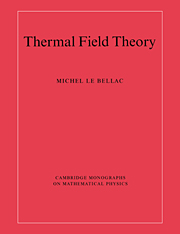Book contents
- Frontmatter
- Contents
- Preface
- 1 Introduction
- 2 Quantum statistical mechanics
- 3 The scalar field at finite temperature
- 4 Simple applications of perturbation theory
- 5 Dirac and gauge fields at finite temperature
- 6 Collective excitations in a plasma
- 7 Hard thermal loops and resummation
- 8 Dynamical screening
- 9 Neutrino emission from stars
- 10 Infrared problems at finite temperature
- A Formulary
- B Operator formalism
- References
- Index
7 - Hard thermal loops and resummation
Published online by Cambridge University Press: 05 May 2010
- Frontmatter
- Contents
- Preface
- 1 Introduction
- 2 Quantum statistical mechanics
- 3 The scalar field at finite temperature
- 4 Simple applications of perturbation theory
- 5 Dirac and gauge fields at finite temperature
- 6 Collective excitations in a plasma
- 7 Hard thermal loops and resummation
- 8 Dynamical screening
- 9 Neutrino emission from stars
- 10 Infrared problems at finite temperature
- A Formulary
- B Operator formalism
- References
- Index
Summary
In the preceding chapter we have learned that the leading behaviour in temperature of the gauge particle and fermion self-energy is proportional to T2, and that this behaviour is obtained without too much effort in the HTL approximation. In the present chapter we generalize these results to N-point functions, computed at the one-loop approximation. We shall show that some (but not all!) N-point functions also behave as T2, and that these N-point functions have rather simple expressions in the HTL approximation. This situation should be constrasted with that of the ϕ4-theory, where only the two-point function behaves as T2: once more, gauge theories are much richer than scalar theories.
We shall also discover that these N-point functions obey remarkable Ward identities, and that there are again striking similarities between QED and QCD. All our results can be expressed in a compact way by writing an effective Lagrangian. Most importantly, we shall show how to correct naïve perturbation theory, which breaks down for soft external momenta, by using a resummed (or effective) perturbative expansion. Some applications to physical processes will be given in section 7.3, and more will be given in the following chapters. We conclude with a kinetic derivation of hard thermal loops, which generalizes the results of section 6.4.
- Type
- Chapter
- Information
- Thermal Field Theory , pp. 150 - 190Publisher: Cambridge University PressPrint publication year: 1996



